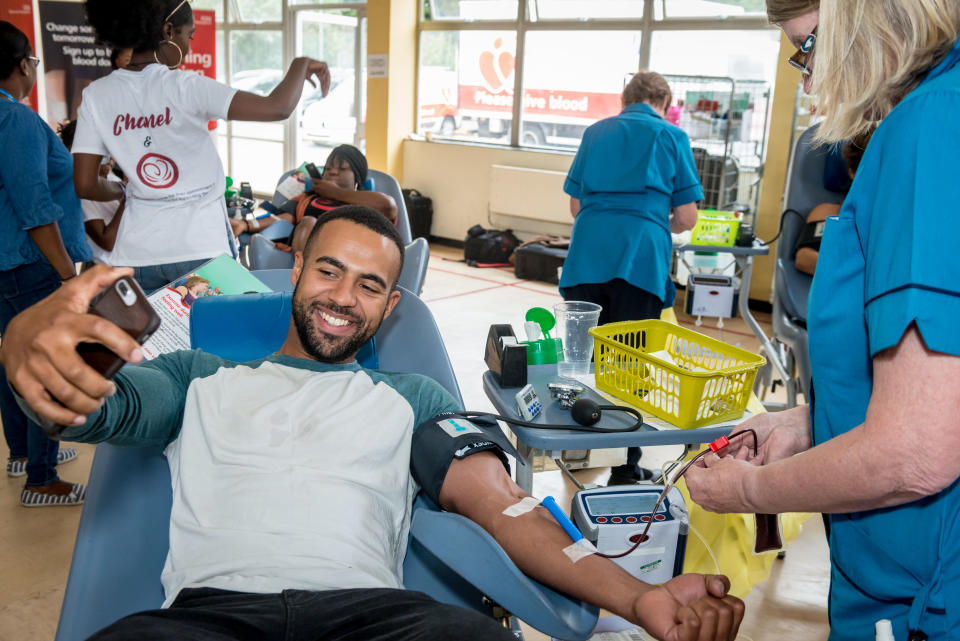NHS appeals for more ethnic men to step forward and donate blood

The NHS has launched an urgent appeal calling on more black men to donate blood.
NHS Blood and Transplant says that unless tens of thousands more black minority ethnic men come forward, there will be shortage of some rarer blood types.
Only 1% of all active donors are black minority ethnic (BME) and, although that means there are currently 17,000 black blood donors, the NHS says it needs at least 40,000 more to help with the shortfall.
This is because some genetic diseases, such as sickle cell, are more common within the black community and blood from the same ethnic group is more likely to be a match.
In addition, some blood groups such as O Rh+ and B Rh+ are more prevalent among black, Asian and minority ethnic (BAME) communities.
They also need more organ and bone marrow donors from BAME communities.
Why is it hard to get some people to donate?
The NHS needs nearly 210,000 new blood donors each year to replace those who stop donating and to ensure they have the right mix of blood groups to match patient needs in the future.
This is the reason for the push, but often their appeals fall on deaf ears.
According to Ronke Oke, marketing manager for ACLT, a charity for connecting BME patients with matching donors, there are a whole realm of reasons why people don’t donate.
She said to Yahoo News UK: “Firstly people don’t get around to doing it and they put it off until they see us at one of our events.
“Also there’s a fear factor of needles, people are afraid that it will hurt them.
“And finally there are the myths, taboos, and some people feel their religion doesn’t allow them to.
“But nine times out of ten, when we’ve done our donation drives, given the information, shown them the importance of this and allowed them to make informed decisions these people join up.”

What is sickle cell disease?
Sickle cell disease is a genetic disorder which affects between 13,000-15,000 people in the UK and causes the red blood cells to become ‘sickle shaped’.
This means they cannot transport oxygen, causing mild to severe anaemia.
Also there is the increased risk that they block blood vessels and make clots.
In some extreme cases sickle cell can even lead to death.
Emmanuel Amuah, an assistant sales manager, has a severe form of sickle cell disease and requires blood transfusions every five weeks.
He needs 11 blood bags every time, roughly 114 a year, and each session lasts about three hours.
“Having sickle cell impacts every aspect of your life, from your social life to the underwear and socks you’re allowed to wear,” he told Yahoo News UK.
“This is because of the elasticated waistline of the socks, it’s something that can restrict blood flow so we need to be cautious when buying and wearing these things.
“My blood group is A+, so I can receive blood from O-, O+, A-, A+, but someone who is O- can only receive O- blood.
“Sickle cell has even put me on death’s door a couple of times.
“Once I caught pneumonia, my lungs collapsed and my family were told by the doctors to say their goodbyes because they didn’t think I was going to make it.
“But here I am.”
Isn’t all blood the same?
While men and women do share the same blood types, men’s blood typically has fewer antibodies.
This is useful for processing and creating products such as plasma (the colourless liquid part of blood) and platelets (tiny blood cells that help your body form clots to stop bleeding).
Also if too many antibodies are present in the blood, it can present adverse reactions in vulnerable patients.
Although demand has fallen 3-4% per year due to improvements in clinical practice, they still need to collect around 1.4 million units of blood every year to meet the needs of patients across England.
One reporter Greg McKenzie also decided to do his part and donated blood live on BBC Radio London.

He said to Yahoo News UK: “The last time I gave blood was five years ago and then I stopped because I just didn’t have the time.
“But now I was actually doing a story as a journalist on this and thought I can’t be preaching to the public if I don’t do it myself as well.
“So I did it again and I’m really pleased I did because now I will go back every four months.
“The whole process of registering and donating blood took no more than 45 mins.
“I say to everyone just do it, you’ll be saving a life.
“It’s quite incredible to think that my blood is going to a crash victim, cancer patient or anyone needing a transfusion.”
Register here to be a blood donor and give blood.

 Yahoo News
Yahoo News 

